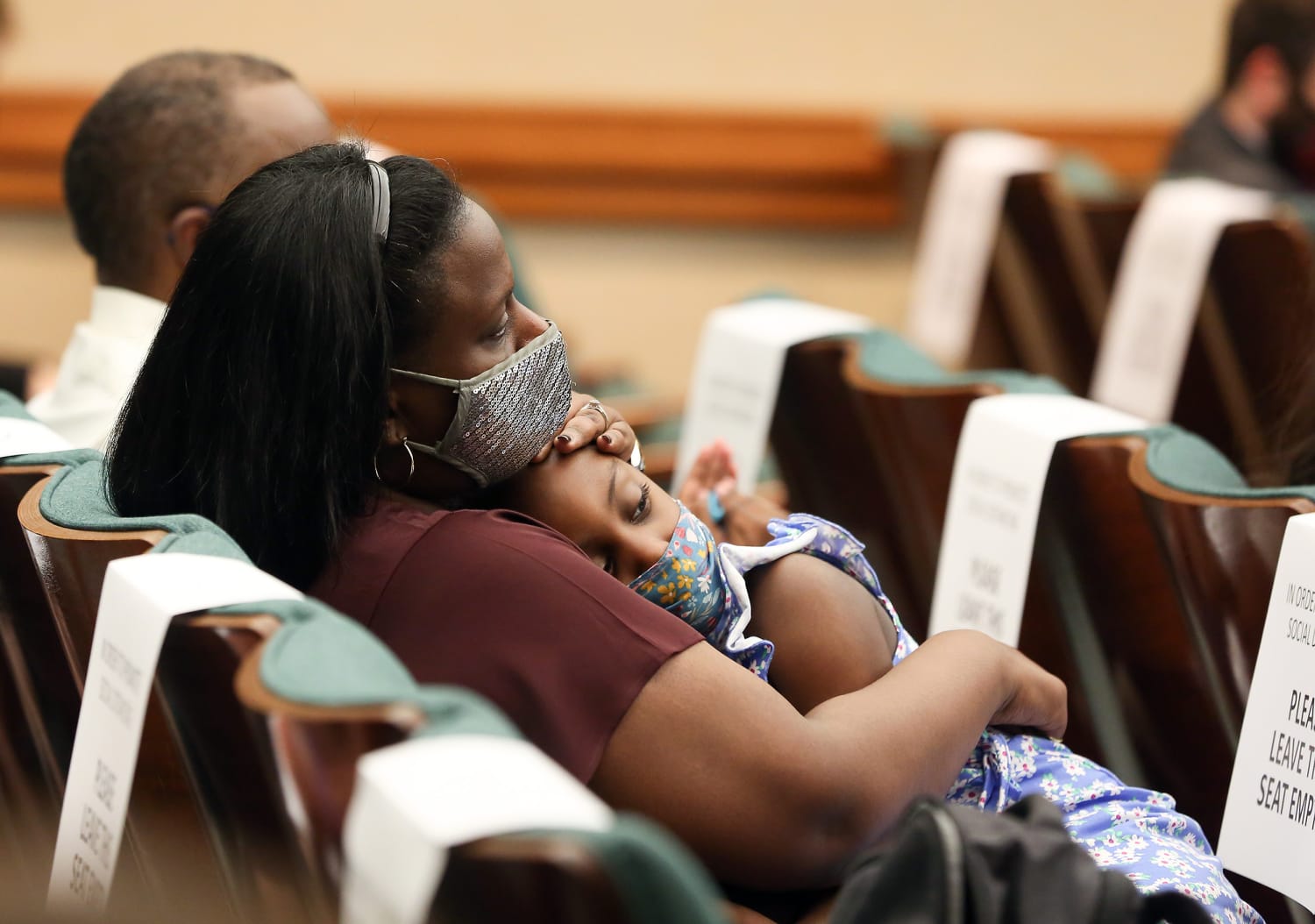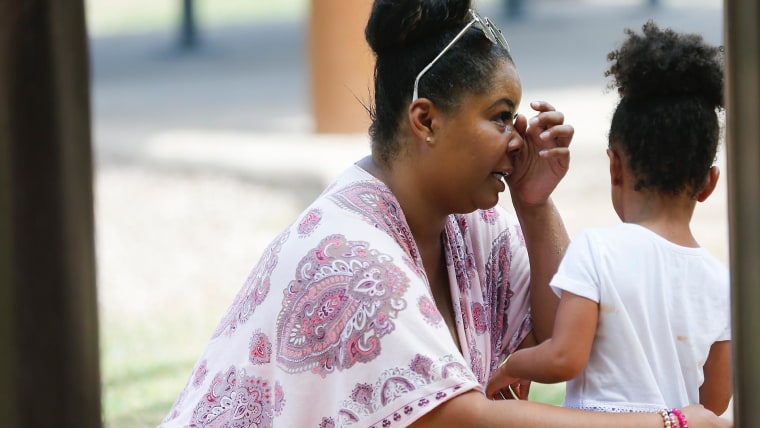This article was published in partnership with the Houston Chronicle.
AUSTIN, Texas — Ann Marie Timmerman still chokes up when she talks about the moment a Child Protective Services investigator showed up to take custody of her baby, but she tried to remain composed Tuesday as she stepped up to a lectern and described her ordeal to state lawmakers.
In 2016, she’d rushed her lethargic 4-month-old son to a Houston hospital, where she learned he had suffered a small amount of bleeding around his brain. A child abuse pediatrician told Child Protective Services, or CPS, that the injury could only have been the result of child abuse.
Based on that opinion alone — and without considering a report from a pediatric neurosurgeon who disagreed, saying the injury was probably the result of childbirth — CPS took emergency custody of the baby, records show.
“I stand in front of y’all a mother that suffered the great trauma of having her medically fragile infant ripped from her arms, all because of a single doctor’s opinion,” Timmerman told members of the Texas House of Representatives committee that oversees the state’s child welfare system.
She was among several parents who traveled from across Texas to share similar stories and urge lawmakers to pass a bill, introduced by state Rep. Stephanie Klick, a Republican, that would require state CPS investigators to consider additional medical opinions before taking children from their parents.
The legislation, which was drafted following a 2019 NBC News and Houston Chronicle investigation into the plight of parents who had been accused of abuse based on mistaken reports by doctors, is one of at least 17 bills working their ways through the Legislature that seek to overhaul the state’s child welfare system with the goal of protecting innocent families.
The NBC News and Chronicle reporting focused primarily on the work of child abuse pediatricians, a small but growing subspecialty of physicians who work closely with state child welfare agencies. They provide expert reports and court testimony in thousands of cases every year, shielding untold numbers of abused children from additional harm. But when the evidence is not clear, the investigation found, a mistaken or overstated diagnosis of child abuse can devastate a family.
One of the Texas bills inspired in part by the reporting, introduced by Republican Sen. Lois Kolkhorst, would require a state commission to study the work of state-funded child abuse pediatricians and propose improvements to the process that CPS follows when relying on their medical reports. Another bill, introduced by Republican Rep. James Frank, would amend the definition of physical and medical neglect to prevent CPS from separating families in cases in which there is not evidence that children are in “immediate danger.”
Most of the proposals have been introduced by members of the Legislature’s Republican majority, but several have the support of Democrats, part of a growing bipartisan movement aimed at preventing traumatic and unnecessary family separations like those highlighted in the NBC News and Chronicle investigation.
“One thing we have talked about a lot is ‘Are we doing more harm to the child through the removal?'” said state Rep. Gene Wu, a Houston Democrat who has signed on as co-sponsor of Frank’s bill. “You’re going to cause trauma when you remove a kid, and is that trauma worth it?”
Republican Gov. Greg Abbott has signaled support for reforming the child welfare system in this legislative session, but his office has not publicly weighed in on specific legislation. Although some of the bills working their way through committees might ultimately be consolidated, top lawmakers said there is strong momentum to pass significant changes this year.
Child welfare advocacy groups in Texas have broadly endorsed the goal of preventing needless child removals but have also raised concerns about the potential unintended consequence of leaving vulnerable children in homes that turn out to be unsafe. Will Francis, who heads the Texas chapter of the National Association of Social Workers, said any changes to CPS’ duties should come with funding to support families in need of help.
“If you want families to do the best possible job they can raising their kids, you have to give them tools,” Francis said. “You can’t just look the other way and say we’re not going to consider this abuse and neglect anymore.”
Patrick Crimmins, a spokesman for the Texas Department of Family and Protective Services, which oversees CPS, said the agency does not comment on proposed legislation or its handling of individual cases.
Dr. Natalie Kissoon, a child abuse pediatrician from San Antonio, and Stacy Wilson, president of the Children’s Hospital Association of Texas, raised concerns during Tuesday’s hearing that Klick’s bill to enable parents to request second medical opinions, as currently drafted, could lead to delays in removing children from dangerous homes. They argued that child abuse pediatricians already consult with specialists before making conclusions about whether a child’s injuries are consistent with abuse. And they said no doctor can take a child from parents; that power rests with CPS and the courts.
But Wilson acknowledged that some of the stories shared by parents during the hearing were concerning, and she agreed that some changes may be warranted.
“Clearly, what you’ve heard here today, the process broke down and it does need to be improved,” Wilson said. “And we are supportive of that.”
Klick said the goal of the legislation is to add “checks and balances” to CPS’ decision-making. The NBC News and Chronicle investigation highlighted several cases, including Timmerman’s, in which CPS took children based on child abuse pediatricians’ reports, despite conflicting evidence and differing opinions from other medical specialists.
Klick’s bill would allow parents who have been accused of abuse based on reports from child abuse pediatricians to request second medical opinions from qualified specialists and require CPS to consider the second opinions. Klick said the legislation was a step toward acknowledging a reality affecting all fields of medicine: Doctors can get it wrong.
“Second opinions are standard practice in medicine, and this bill brings the same practice into this specific area,” Klick said.
Timmerman, who plans to return to Austin in the coming weeks to speak in support of other bills to make changes at CPS, told the committee that Klick’s legislation would have made all the difference in her case.
Months after CPS took custody of her baby, Tristan, three outside medical experts reviewed his medical records and, like the neurosurgeon who had initially treated him, saw no reason to conclude that he had been abused. They found that the baby suffered from an underlying medical condition that most likely led to the bleeding around his brain. It took seven months and cost the Timmermans $200,000 in legal fees to regain custody and clear their names.
“Families deserve due process and second opinions,” Timmerman said. “If all of Tristan’s medical diagnoses had been considered under the conditions of this proposed bill, due process would have been given to our family by allowing unbiased second opinions that ultimately would have prevented his removal.”
Ajshay James lost custody of her 2-year-old daughter after doctors at Texas Children’s Hospital in Houston accused her of giving the child unneeded medical treatments in 2017. The NBC News and Chronicle investigation found that doctors repeatedly overstated the evidence against her, although the hospital has defended its handling of the case.
James, who has regained custody of her daughter, cried as she described her long legal battle. She told lawmakers that, as far as CPS was concerned, the opinion of the child abuse pediatrician was all that mattered.
James asked the committee to protect “those of us who had done the right thing, those of us who had trusted the medical professionals, those of us who had the scarlet letter imposed upon us. Do the right thing, please, and allow us to have due process.”
Sharde Butler came from Houston to speak in support of the bill. She attended the hearing with her two young children, who were separated from her for nearly two years after a child abuse specialist at Texas Children’s told CPS in 2017 that her infant son’s back and head injuries looked like abuse and could not have been the result of her husband’s accidentally dropping him. Texas Children’s has defended its doctors’ handling of the case, noting that Butler’s child suffered serious injuries and that “mandatory reporting to CPS was required.”
Follow-up examinations at another hospital revealed discrepancies in the medical reports provided to CPS, raising questions about the abuse diagnosis, but Butler told lawmakers that the agency and the judge presiding over her case refused to return the children.
“We would go to court and our judge would tell us that it didn’t matter what we said, that he only listened to the child abuse doctors,” said Butler, whose ordeal was chronicled in the 2020 NBC News and Wondery podcast “Do No Harm.”
Butler and her husband regained custody of their children only after a new judge took over the case and agreed to consider all of the medical evidence. She said that her family is still struggling to recover from the trauma but that she hopes her story can inspire changes.
“I missed my son’s first birthday, I missed his first Christmas, I missed his first Thanksgiving,” she said. “I can’t ever get that back.”
Keri Blakinger and Cayla Harris reported from Austin; Mike Hixenbaugh reported from Houston.
Source: | This article originally belongs to Nbcnews.com











